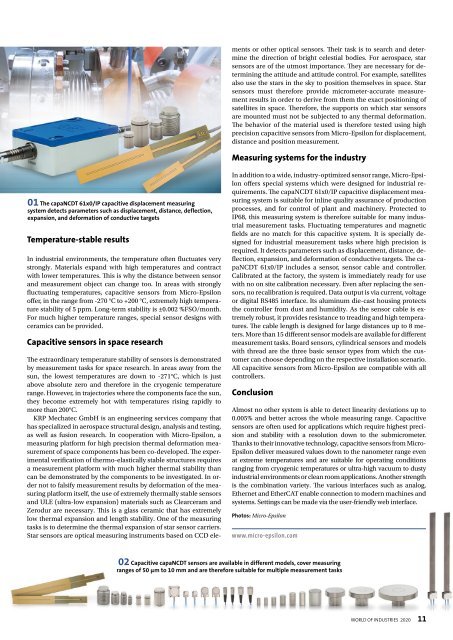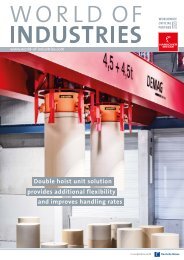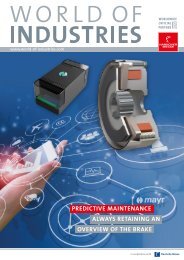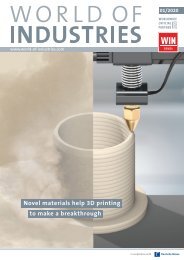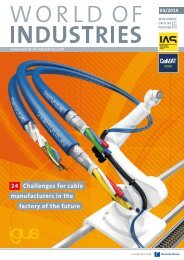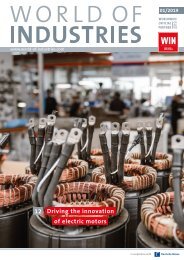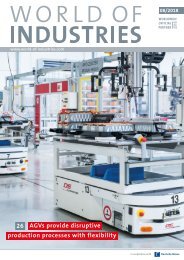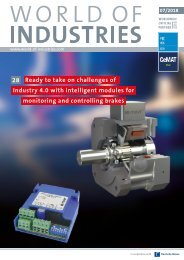WORLD OF INDUSTRIES 4/2020
WORLD OF INDUSTRIES 4/2020
WORLD OF INDUSTRIES 4/2020
You also want an ePaper? Increase the reach of your titles
YUMPU automatically turns print PDFs into web optimized ePapers that Google loves.
The extraordinary temperature stability of sensors is demonstrated<br />
by measurement tasks for space research. In areas away from the<br />
sun, the lowest temperatures are down to -271°C, which is just<br />
above absolute zero and therefore in the cryogenic temperature<br />
range. However, in trajectories where the components face the sun,<br />
they become extremely hot with temperatures rising rapidly to<br />
more than 200°C.<br />
KRP Mechatec GmbH is an engineering services company that<br />
has specialized in aerospace structural design, analysis and testing,<br />
as well as fusion research. In cooperation with Micro-Epsilon, a<br />
measuring platform for high precision thermal deformation measurement<br />
of space components has been co-developed. The experimental<br />
verification of thermo-elastically stable structures requires<br />
a measurement platform with much higher thermal stability than<br />
can be demonstrated by the components to be investigated. In order<br />
not to falsify measurement results by deformation of the measuring<br />
platform itself, the use of extremely thermally stable sensors<br />
and ULE (ultra-low expansion) materials such as Clearceram and<br />
Zerodur are necessary. This is a glass ceramic that has extremely<br />
low thermal expansion and length stability. One of the measuring<br />
tasks is to determine the thermal expansion of star sensor carriers.<br />
Star sensors are optical measuring instruments based on CCD elements<br />
or other optical sensors. Their task is to search and determine<br />
the direction of bright celestial bodies. For aerospace, star<br />
sensors are of the utmost importance. They are necessary for determining<br />
the attitude and attitude control. For example, satellites<br />
also use the stars in the sky to position themselves in space. Star<br />
sensors must therefore provide micrometer-accurate measurement<br />
results in order to derive from them the exact positioning of<br />
satellites in space. Therefore, the supports on which star sensors<br />
are mounted must not be subjected to any thermal deformation.<br />
The behavior of the material used is therefore tested using high<br />
precision capacitive sensors from Micro-Epsilon for displacement,<br />
distance and position measurement.<br />
Measuring systems for the industry<br />
01 The capaNCDT 61x0/IP capacitive displacement measuring<br />
system detects parameters such as displacement, distance, deflection,<br />
expansion, and deformation of conductive targets<br />
Temperature-stable results<br />
In industrial environments, the temperature often fluctuates very<br />
strongly. Materials expand with high temperatures and contract<br />
with lower temperatures. This is why the distance between sensor<br />
and measurement object can change too. In areas with strongly<br />
fluctuating temperatures, capacitive sensors from Micro-Epsilon<br />
offer, in the range from -270 °C to +200 °C, extremely high temperature<br />
stability of 5 ppm. Long-term stability is ±0.002 %FSO/month.<br />
For much higher temperature ranges, special sensor designs with<br />
ceramics can be provided.<br />
Capacitive sensors in space research<br />
In addition to a wide, industry-optimized sensor range, Micro-Epsilon<br />
offers special systems which were designed for industrial requirements.<br />
The capaNCDT 61x0/IP capacitive displacement measuring<br />
system is suitable for inline quality assurance of production<br />
processes, and for control of plant and machinery. Protected to<br />
IP68, this measuring system is therefore suitable for many industrial<br />
measurement tasks. Fluctuating temperatures and magnetic<br />
fields are no match for this capacitive system. It is specially designed<br />
for industrial measurement tasks where high precision is<br />
required. It detects parameters such as displacement, distance, deflection,<br />
expansion, and deformation of conductive targets. The capaNCDT<br />
61x0/IP includes a sensor, sensor cable and controller.<br />
Calibrated at the factory, the system is immediately ready for use<br />
with no on site calibration necessary. Even after replacing the sensors,<br />
no recalibration is required. Data output is via current, voltage<br />
or digital RS485 interface. Its aluminum die-cast housing protects<br />
the controller from dust and humidity. As the sensor cable is extremely<br />
robust, it provides resistance to treading and high temperatures.<br />
The cable length is designed for large distances up to 8 meters.<br />
More than 15 different sensor models are available for different<br />
measurement tasks. Board sensors, cylindrical sensors and models<br />
with thread are the three basic sensor types from which the customer<br />
can choose depending on the respective installation scenario.<br />
All capacitive sensors from Micro-Epsilon are compatible with all<br />
controllers.<br />
Conclusion<br />
Almost no other system is able to detect linearity deviations up to<br />
0.005% and better across the whole measuring range. Capacitive<br />
sensors are often used for applications which require highest precision<br />
and stability with a resolution down to the submicrometer.<br />
Thanks to their innovative technology, capacitive sensors from Micro-<br />
Epsilon deliver measured values down to the nanometer range even<br />
at extreme temperatures and are suitable for operating conditions<br />
ranging from cryogenic temperatures or ultra-high vacuum to dusty<br />
industrial environments or clean room applications. Another strength<br />
is the combination variety. The various interfaces such as analog,<br />
Ethernet and EtherCAT enable connection to modern machines and<br />
systems. Settings can be made via the user-friendly web interface.<br />
Photos: Micro-Epsilon<br />
www.micro-epsilon.com<br />
02 Capacitive capaNCDT sensors are available in different models, cover measuring<br />
ranges of 50 µm to 10 mm and are therefore suitable for multiple measurement tasks<br />
<strong>WORLD</strong> <strong>OF</strong> <strong>INDUSTRIES</strong> <strong>2020</strong> 11


